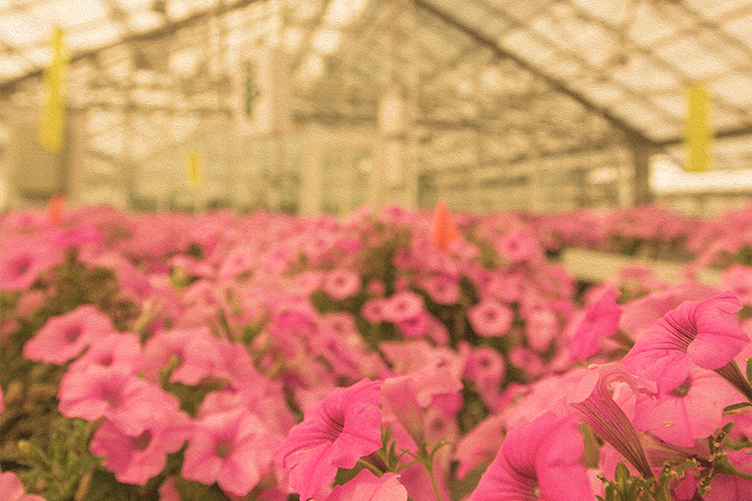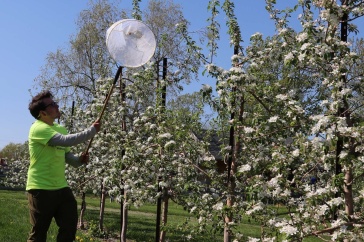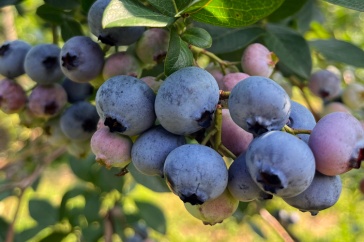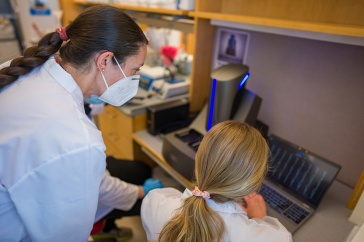
The New Hampshire Agricultural Experiment Station is excited to welcome our community of supporters back to the Macfarlane Research Greenhouses Open House. After two years of having to call off the event due to COVID precautions, there's much to showcase. Come greet the Spring with UNH!
On Saturday, April 2, 2022 between 9 a.m. and 3 p.m., come meet and learn from NH Agricultural Experiment Station scientists about the latest greenhouse research, discover new skills from UNH Cooperative Extension professionals and Master Gardeners, and tour the new $2.58 million greenhouse addition. The event is free and open to the public.
A facility of the NH Agricultural Experiment Station, the UNH Macfarlane Research Greenhouses provides a venue for UNH faculty, staff and students to present colorful displays and educational lectures of interest to greenhouse producers, landscapers, and home gardeners. Visitors will learn about bee-friendly gardens and landscapes, development of new economically valuable crop species for Northern New England, status and issues in plant biotechnology, and a Q&A with Master Gardeners.
This year, there will be an opening ceremony and guided tour of the $2.58 million greenhouse addition, with welcome remarks by UNH President James W. Dean, Jr. The tour will showcase the modernization of the Macfarlane Greenhouse complex, with greenhouse manager Luke Hydock discussing how the addition will provide new avenues for advancing research. The tour will begin at 10 a.m. and registration is requested.
Additionally, visitors will have an opportunity to grab lunch prepared by the UNH Food Repurposing Project at the nearby Barton Hall teaching kitchens. The Food Repurposing Project is a joint effort between UNH and Gather, a Portsmouth-based food pantry, that seeks to convert unused food items from UNH dining halls into healthy, high-quality meals. The meals will be made available to everyone, with a suggested donation encouraged to support the Food Repurposing Project going forward.
For more information and updates about presenters and agenda, please https://colsa.unh.edu/2022openhouse. The UNH Greenhouse Open House is sponsored by the NH Agricultural Experiment Station and UNH Cooperative Extension.
The UNH Macfarlane Research Greenhouses are located off Main Street on the west end of Durham. Seminars will take place in Putnam Hall across the parking lot from the greenhouses. Parking on Saturday is free. Handicap parking spaces and short-term parking for plant pickup will be available near the main greenhouse entrance. The greenhouses are also served by Wildcat Transit’s shuttle service: https://www.unh.edu/transportation/wildcat-transit.
Founded in 1887, the NH Agricultural Experiment Station at the UNH College of Life Sciences and Agriculture is UNH’s original research center and an elemental component of New Hampshire's land-grant university heritage and mission. We steward federal and state funding, including support from the USDA National Institute of Food and Agriculture, to provide unbiased and objective research concerning diverse aspects of sustainable agriculture and foods, aquaculture, forest management, and related wildlife, natural resources and rural community topics. We maintain the Woodman and Kingman agronomy and horticultural research farms, the Macfarlane Research Greenhouses, the Fairchild Dairy Teaching and Research Center, and the Organic Dairy Research Farm. Additional properties also provide forage, forests and woodlands in direct support to research, teaching, and outreach.
Since 1915, the University of New Hampshire Cooperative Extension (UNH Extension) has improved people's lives by providing research-based information and non-formal education programs on topics important to the state. Through partnerships with county governments, UNH Extension offices staffed by specialists, educators, support personnel and volunteers are located in each of the state's 10 counties. By working in collaboration with county, state and federal governments, UNH Extension is at work in every New Hampshire county, making the state’s key industries stronger, developing vibrant communities and municipal leaders, fostering healthy families and an informed and engaged citizenry, and keeping the state’s natural resources healthy and productive.



















































